October 26, 2021
FRED DEWEY (1957-2021):
The tribute to Fred Dewey began at 4 p.m. on Saturday. It had not been an easy thing to organize, for Fred was one of those quirky people who was able to align himself with disparate factions of poets and cultural workers and somehow keep them far enough apart to maintain his own surpluses of inner equilibrium. The air-lock compartment approach to social identity and community formation, however, can make it hard for allies to coordinate with each other. Such tensions are perhaps an ineluctable part of the paradoxical intermingling of self, selflessness, and the demands made of those whose subordinated consent makes group effort feasible.
First of all, therefore, it must be said that it is very easy to underestimate the enormity of skillful dedication needed to enable an entity such as Beyond Baroque to survive in a society ravaged by the racist predations of wealth. Without Fred Dewey’s intervention in the mid-1990s, there would have been no Beyond Baroque still in existence to need a renewed lease. It’s not just that Fred led the effort to get another quarter century of a lifeline in Venice for Beyond Baroque. It’s a small miracle that he could keep its programming afloat so that it could even reach that point.
I served on the Board of Trustees under Fred’s leadership at an early crucial turning point of his tenure, and even when I wasn’t on the board, I often found myself called upon to shore up his efforts when I least had the resources to assist him. Not once, but twice I was called upon to help him finish a major grant application on the day it was due. On two different occasions, we got the grant to the LAX post office with only minutes to spare before the midnight postmark deadline. It was emotionally and physically exhausting, and on one occasion it cost me the friendship of another person to whom I had made a promise on how that day would be spent. If I recount this now rather than having said it on Saturday, it is to make it clear how challenging Fred could be. I cared about him deeply, and yet as one of my dear friends once put it, “Fred is both the road and the roadblock.”
Perhaps as in any life that makes a significant difference to a given community, Fred’s decisions and choices will always shimmer with a variety of receptions: admiration as well as puzzled dismay; gratitude as well as exasperated resentment. As befitted the memorial at Beyond Baroque, memories imbued in and replenished by the former feelings navigated the reconciliations that were most empowering for those present. Those who watched it on the live-streaming channel, however, were perhaps the most fortunate portion of the audience. Over a score of people spoke, and the average length was close to seven minutes, almost double the length that had been requested by the event’s organizers. Several of us had thought that there was going to be an intermission, which would have been tricky to pull off and maintain the gathering’s focus on Fred. Nevertheless, it was kind of ironic that Phoebe MacAdams brought up the difference that Fred made in the seating accommodations at Beyond Baroque. People who attend events at BB these days have no idea of how bad the seating was back when he took over as artistic director. Attending an event at BB in the late 20th century made a visit to a chiropractor almost mandatory. Beyond Baroque must have acquired those chairs at a swap meet where no questions were asked about the provenance of any of the wares for sale. My guess is that someone from Beyond Baroque couldn’t resist an apparent bargain. How was that person to discern that this batch of folding chairs had once been employed by KGB interrogation agents? Such was the infrastructure of the institution that Fred took over.
Unfortunately, it seemed as if those chairs had been brought out of storage for Saturday’s event. Two and a half hours without a chance to stand is a long haul when one gets to my age. Well, to be fair, I don’t know that any folding chair is comfortable after a certain length of time, but all the more reason to think about how long an event will require those in attendance to remain continuously seated. I mention this only because I was all too aware of how many of the people in attendance on Saturday are at an age in which this might well be our final decade, and Beyond Baroque will be asked to hold more of these events.
My grousing about the seating and the length of the event will not, I hope, detract too much from the accomplishment of Amelie Frank and Quentin Ring in pulling together this memorial, which was made possible in part by contributions from some people who did not themselves speak at the event. Fred was an exceptional person, but apparently there were more than a few people who took exception about not being asked to speak about Fred or about the general tone of acclamation for Fred’s stewardship of Beyond Baroque. As far as I’m concerned, they are more than welcome to organize another event at a venue of their choosing, and I hope they let me know about it. I would be happy to attend! However, they might will find that it’s one heck of a lot of work to pull off a meaningful memorial, and both Quentin and Amelie deserve the community’s ample gratitude and extended appreciation. I want to thank Mike Bonin as well as Fred’s brother, in particular, for everything they said and how it embedded our tributes to him in both a personal and political context. I would have been happy with a half-dozen speakers, whose intensity of confirmation matched that of Brendan Constantine quite early on in the program. and let the rest of us go individually into the theater and speak to a camera for a permanent record of the occasion’s sentiments.
A blog serves as a chance to mull things over. While technology often forces us to adapt in ways that ways that make us uncomfortable, it could also be of assistance in making things more feasible. Yes, there were more people who wanted to speak that got a chance to do so, and that probably is the case in more than this particular instance. Why not, therefore, feature just a half-dozen people, and then allow those in attendance to mingle and reflect while people go and speak to the camera for the record in a private room to the live-streaming attendance? That ensemble could easily have the order assigned to it in advance, so that editing would be minimal in terms of maintaining a disciplined tempo. One could in fact stop the live-streaming once the assigned list is finished, and then just record for the purpose of posterity. No doubt the desire to hold forth in front of a live audience will prove too irresistible for memorial organizers to choose my proposal, but when it becomes necessary to hold this kind of event for me, I beg of those in charge to make the audience sit no longer than a half-hour. Six speakers, two minutes each.
I hadn’t been to Beyond Baroque in quite some time, and I must say that Quentin Ring has continued Fred’s legacy of improving the infrastructure. The theater is undergoing substantial renovation, and it’s going to be a pleasure to be back in that space.
*********
Here is the text of my tribute to Fred Dewey (1957-2021):
As many of you know, Beyond Baroque started as a publication project. Specifically, it was going to be a literary magazine edited by Beyond Baroque’s founder, George Drury Smith. Over 50 years after the first issue of the magazine was published out of a storefront on West Washington Boulevard (now known as Abbot Kinney), we are gathered to honor the memory of its longest-serving artistic director, Fred Dewey. I would like to pay tribute to Fred by sharing with you the question he asked Vincent Ferrini in an interview that was published in Beyond Baroque magazine, Volume 24, No. 2, published in 2004. The entire issue was edited by Fred, and the questions he posed to Ferrini remain exquisitely pertinent over a decade and a half later.
FRED DEWEY:
“What is a ‘poem in action?’
Is it just your life?
And how is that a poem?
What is the role poetry plays in that?
So, do you think poetry comes out of place?
How do you look at history? You yourself have lived through a tremendous poetic history, a history of a lot of great events and great poets. How do you loo back on history in terms of other poets you’ve known and who have affected you (such as Charles Olson)?
Given the situation of the media today and the contemporary cultural landscape saturated by media, what would your advice be for a young poet?
What happens when people don’t even know they have a community? How do they find that community?
What’s your title Know Fish mean?
(The city) is the thing you know the best and it’s the thing you can speak to other people the best about. It’s what you can tell other people, it’s your home.
And what does that mean?
Sounds like the alchemy of the human, of the universe itself.
Do you fish? You ever go out on the water? What do you find when you go out there?
We have a different ocean on this coast. Have you ever been to Los Angeles before? What do you think the equivalent of fish is in Los Angeles?
Well, I guess that’s the way in which if you teach people that poetry is just self-expression, they’ll never break out of their prison. It’s more than self-expression. If you teach them that poetry is more about language than self-expression, then they have to start to think.
With what (do you infect the community?)
If everyone is quiet and everyone is afraid, then things stay the way they are.
So, you think there’s hope in the children?”
***
I think we can hear in this set of questions the keywords of Fred Dewey’s life: poetry and the quest to define it as a pertinent imaginative force; history; the cultural landscape and media saturation, the paradigm of community as a necessary fiction, the city and the human alchemy therein enacted, the search for equivalents that have metaphoric potential for transformation, the urgent primacy of language as the fundamental groundswell of poetry, and above all, hope for the future.
I can’t think of better things to build a legacy around, and I like to think that we will be able to do so in his memory.
**********
Group photograph from upstairs window
Those pictured include:
Quentin Ring
Rev. Janet Gollery McKeithen (Church in Ocean Park)
Will Alexander
A.K. Toney
Brendan Constantine
Fred’s brother, John Dewey
Judith Taylor
Jeremiah Day
Laurel Ann Bogen
Linda Albertano
Suzanne Lummis
Dorit Cypis
Irene Suico Soriano
Amy Scholder
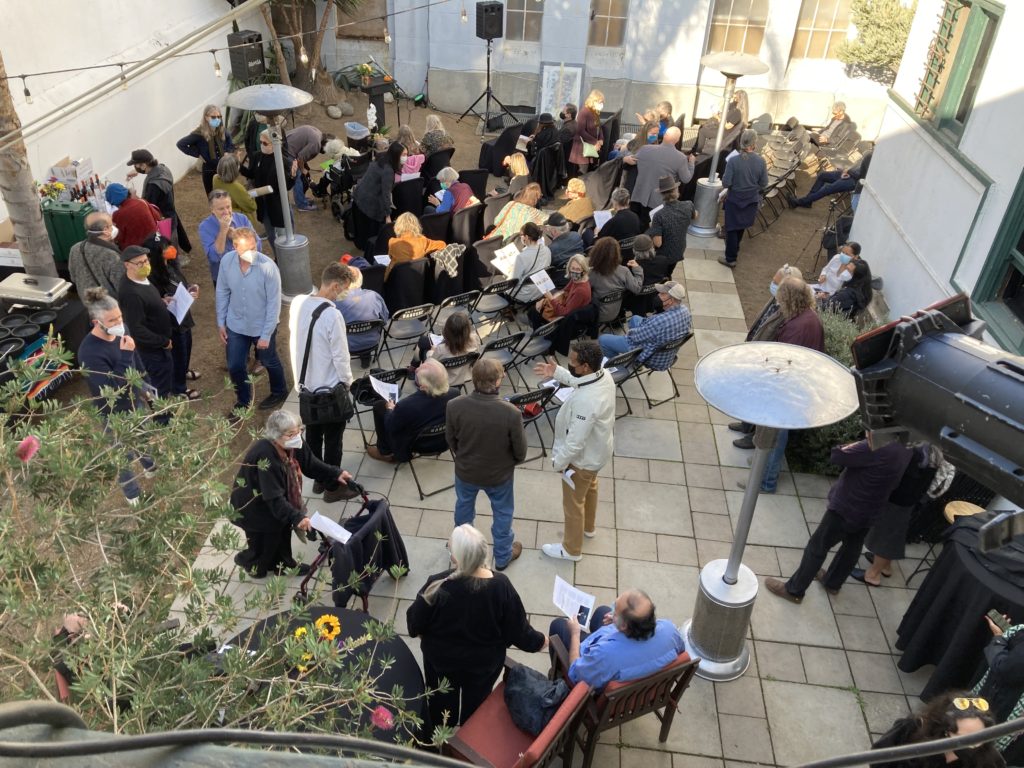
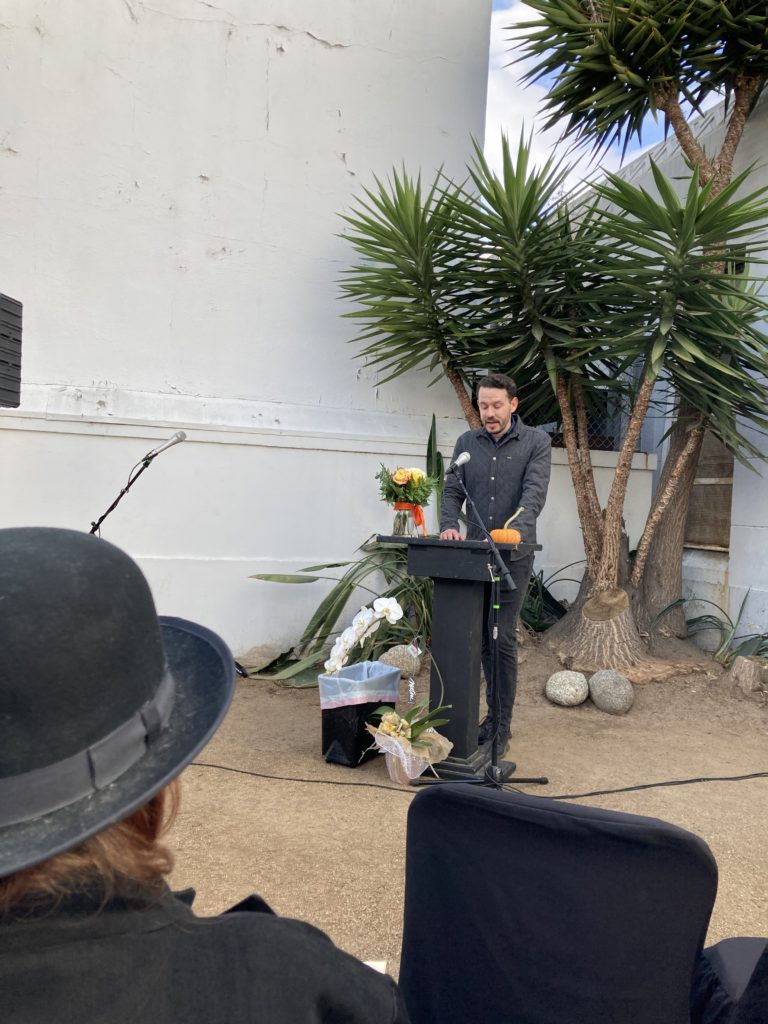
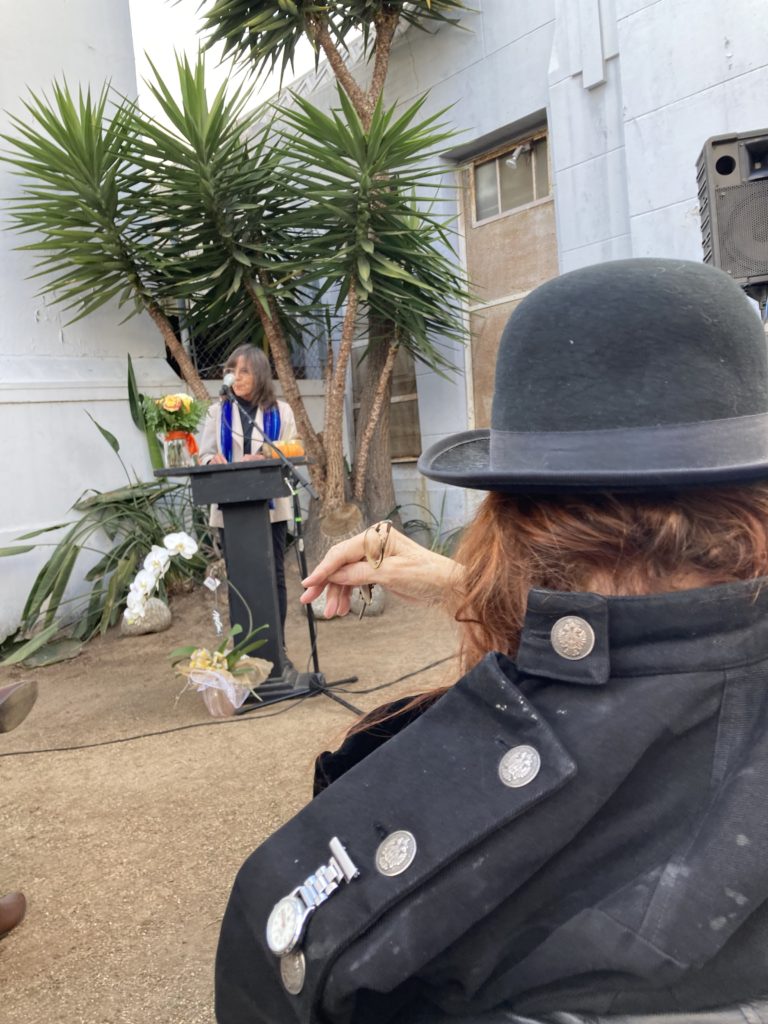
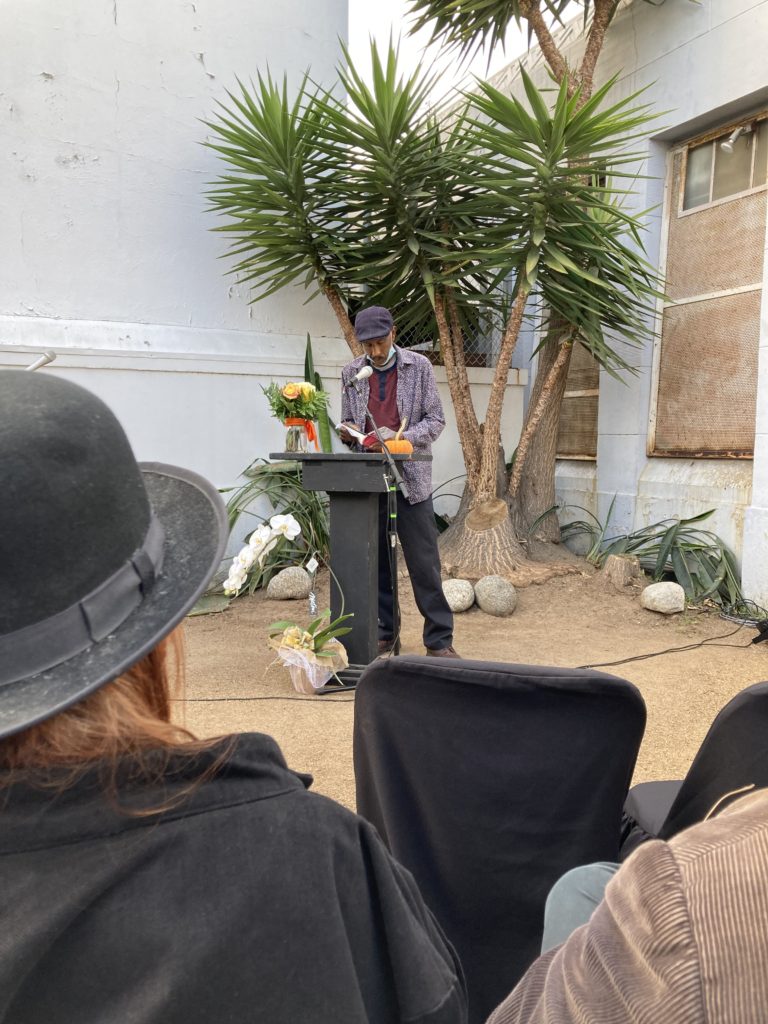
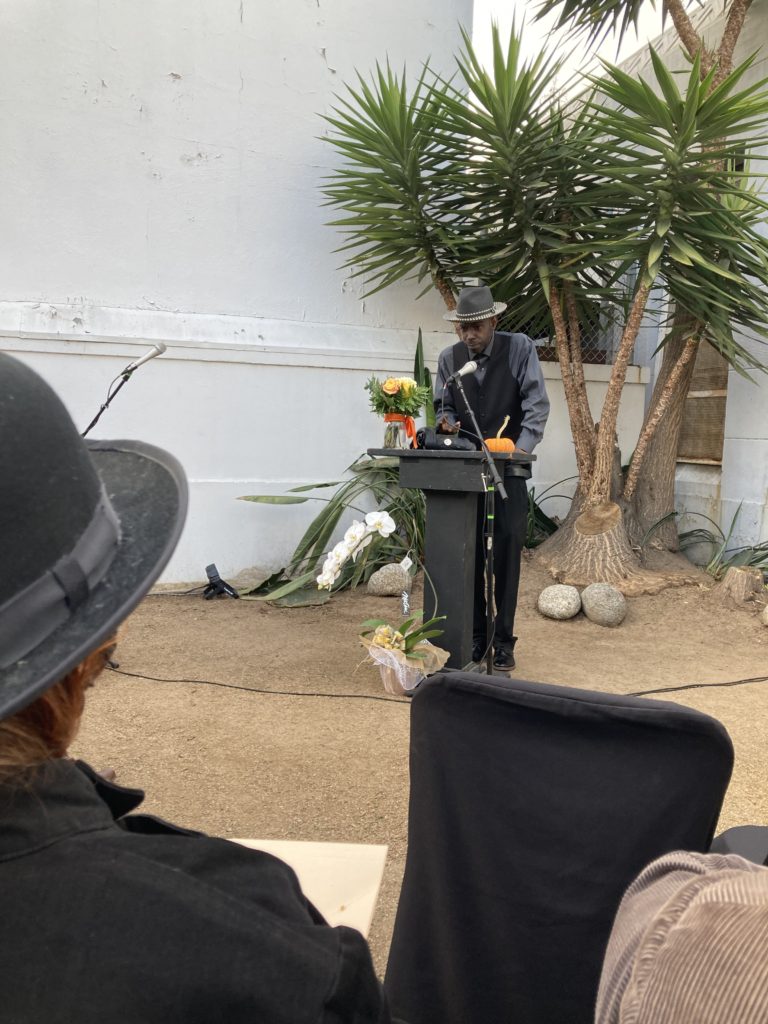
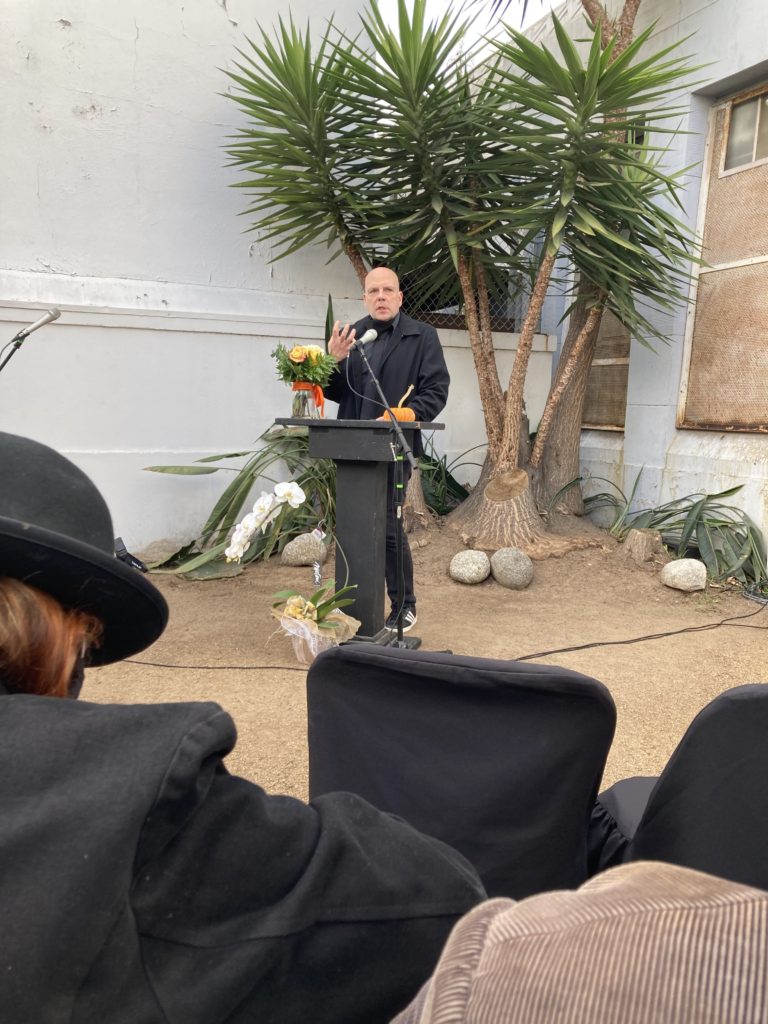
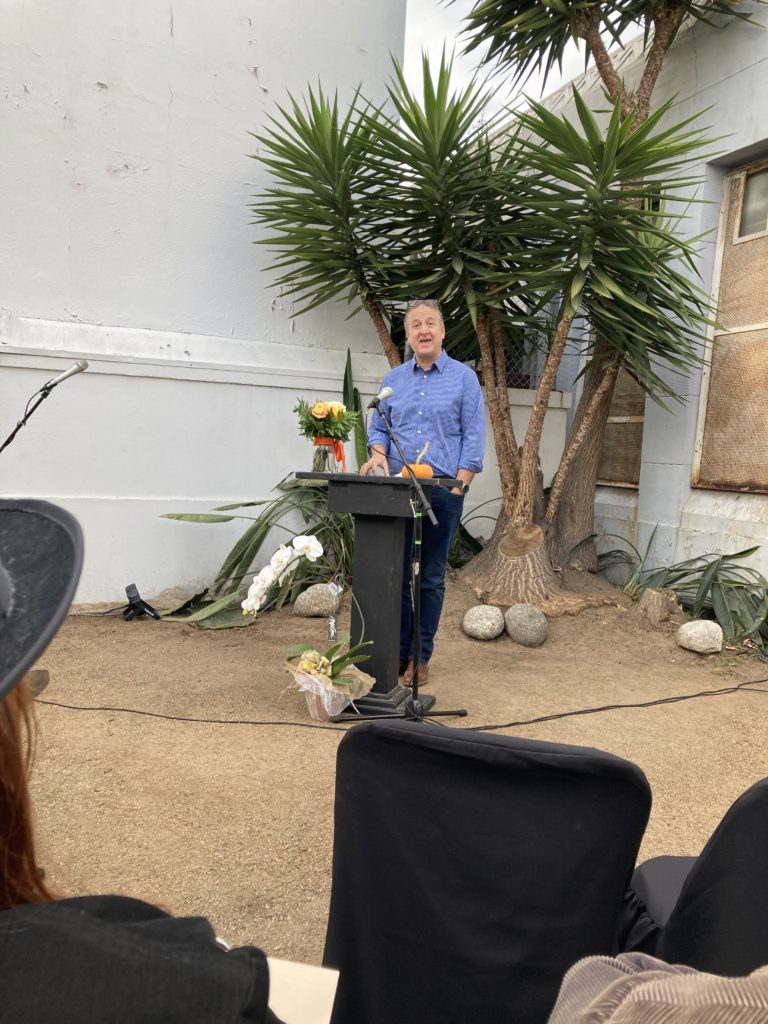
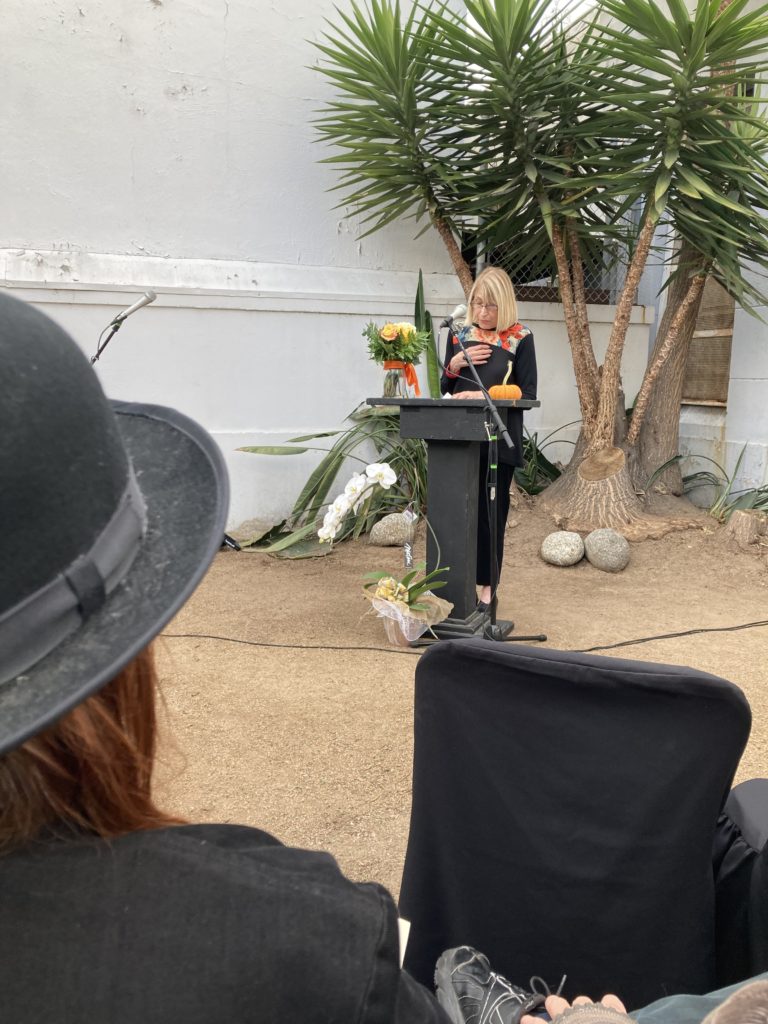
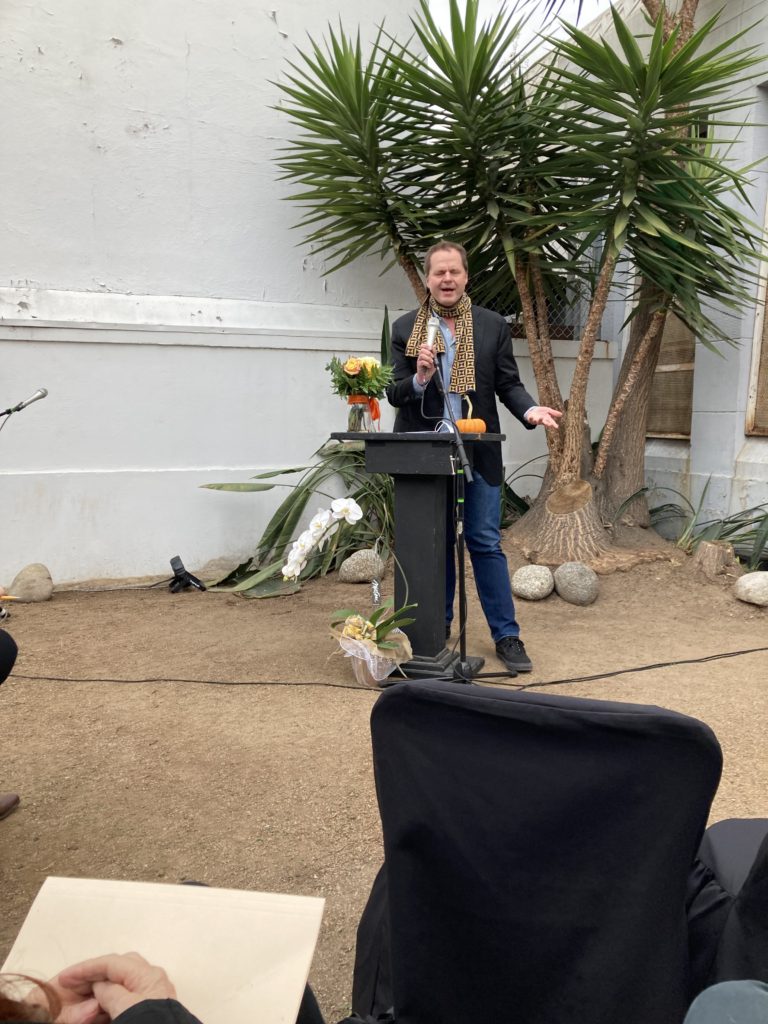
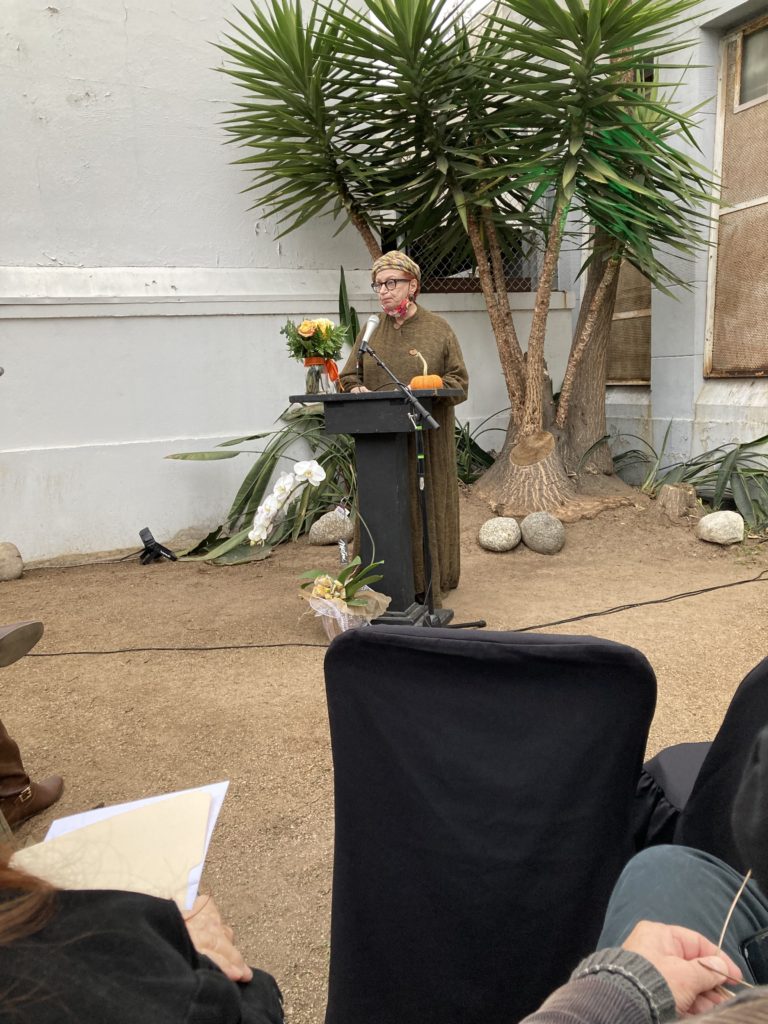
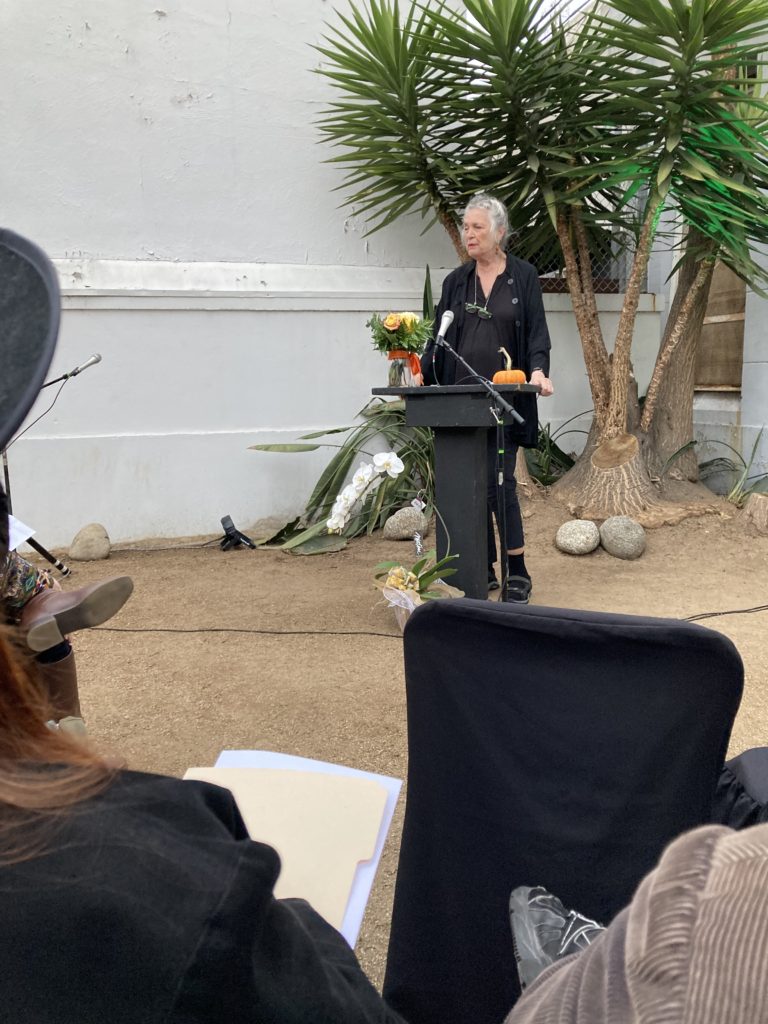
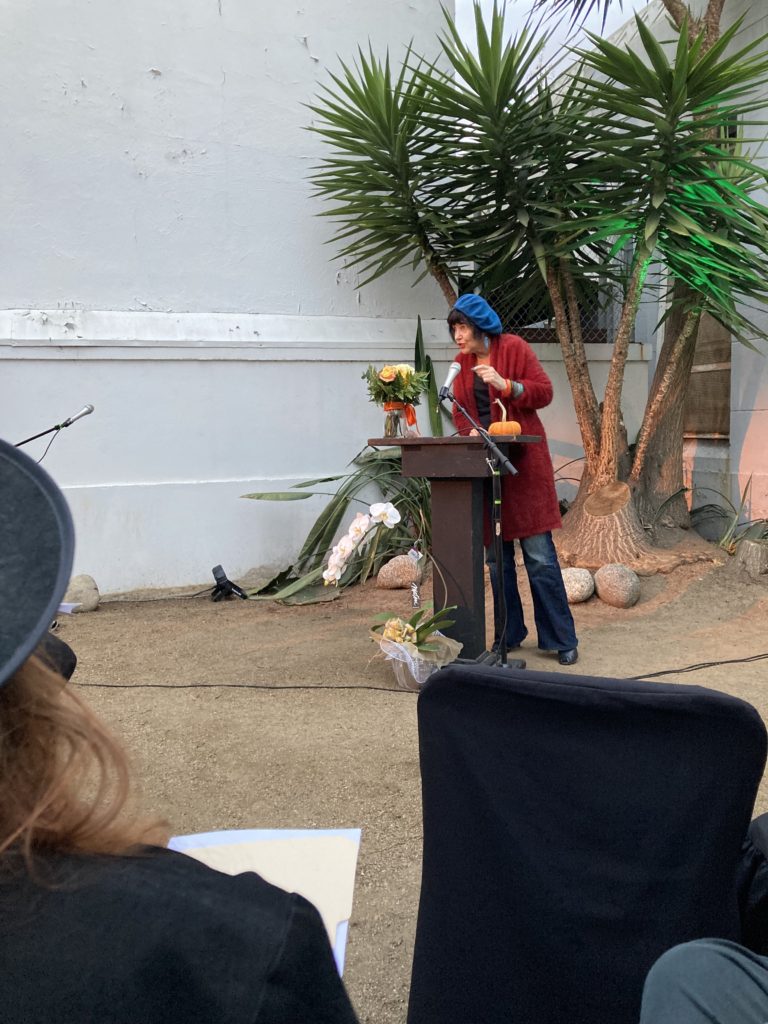
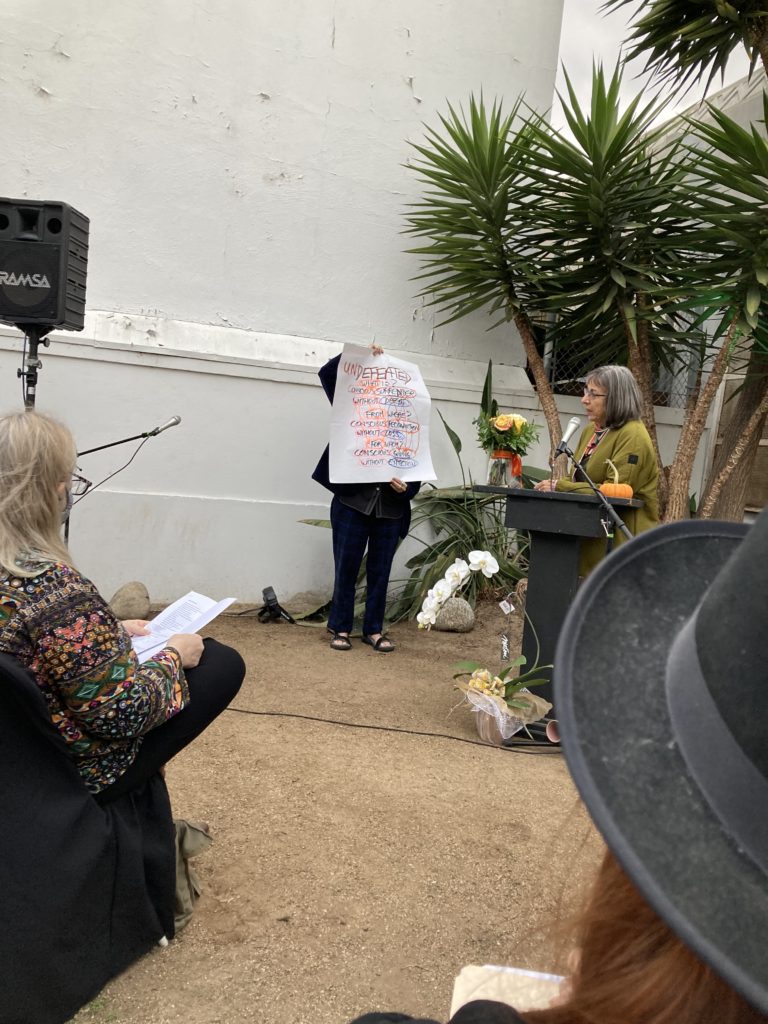
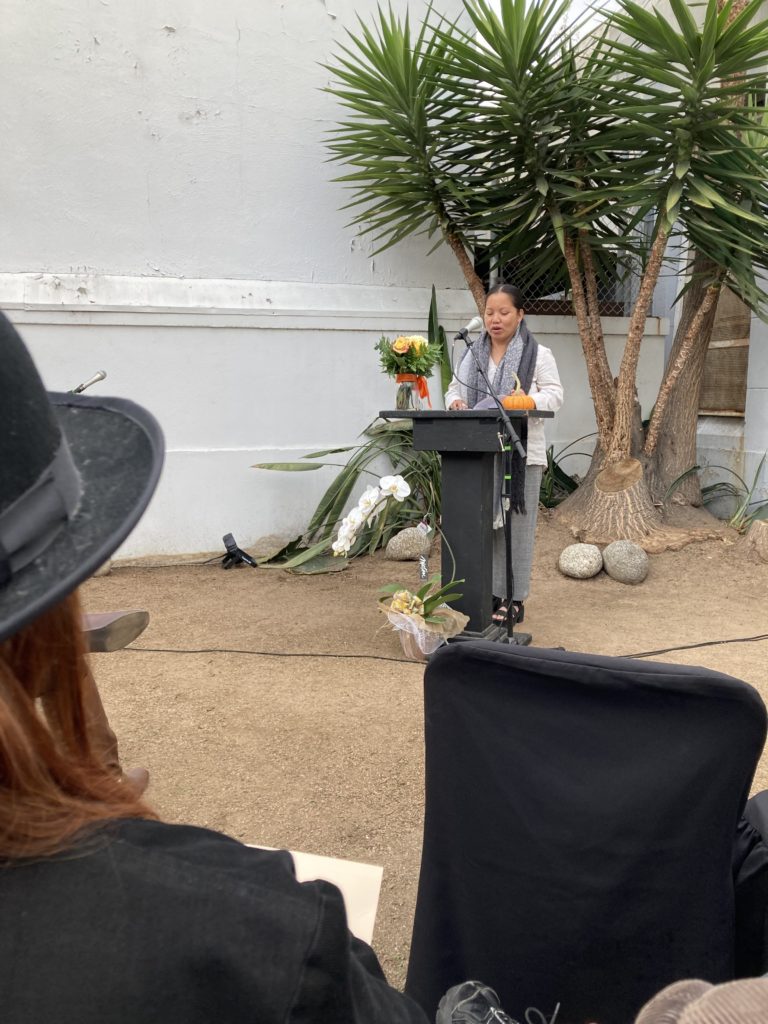
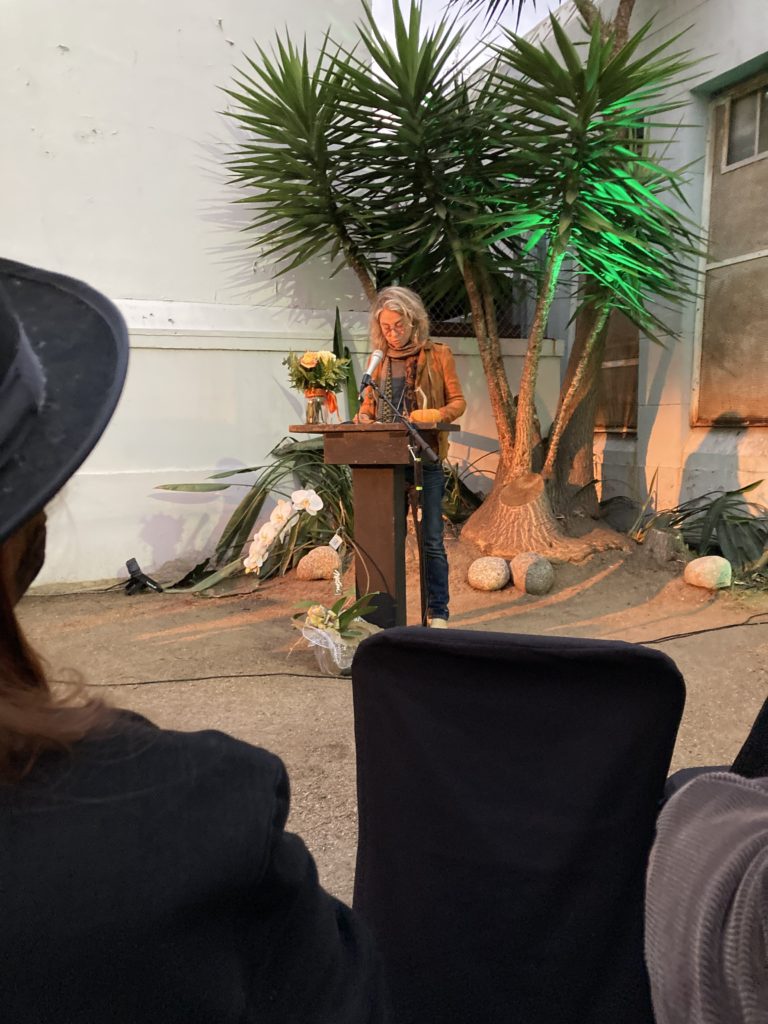
 About Bill Mohr
About Bill Mohr